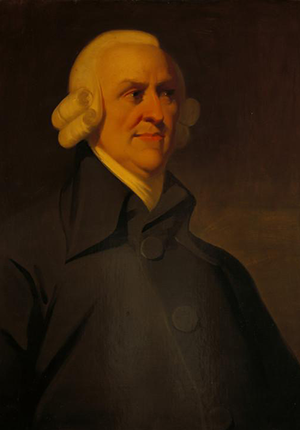Historic Document
An Inquiry into the Nature and Causes of the Wealth of Nations (1776)
Adam Smith | 1776

National Galleries of Scotland, Given by J.H. Romanes 1945
Summary
Adam Smith (1723-90) was the author of The Theory of Moral Sentiments (1759) and An Inquiry into the Nature and Causes of the Wealth of Nations (1776). The former work, which has as its focus relations between human beings well-known to one another, was widely read in American colleges. The latter work, which has as its focus relations between those who are not closely acquainted, was decidedly favorable to the Americans’ claim for independence. It helped shape commercial policy in the fledgling United States and reinforced the Americans’ preference for agriculture. Furthermore, Smith’s defense of religious disestablishment had a considerable impact on public debate regarding the existing state establishments in Virginia and elsewhere. Smith thought that, where there was religious freedom and “a great multitude of religious sects,” the diligence of the clergy would work against civil disorder and have other salutary civil effects.
Selected by

Paul Rahe
Professor of History and Charles O. Lee and Louise K. Lee Chair in the Western Heritage at Hillsdale College

Jeffrey Rosen
President and CEO, National Constitution Center

Colleen A. Sheehan
Professor of Politics at the Arizona State University School of Civic and Economic Thought and Leadership
Selections from I.i.1-iv.1: The greatest improvement in the productive powers of labour, and the greater part of the skill, dexterity, and judgment with which it is any where directed, or applied, seem to have been the effects of the division of labor. . . .
This division of labour, from which so many advantages are derived, is not originally the effect of any human wisdom, which foresees and intends that general opulence to which it gives occasion. It is the necessary, though very slow and gradual consequence of a certain propensity in human nature which has in view no such extensive utility: the propensity to truck, barter, and exchange one thing for another. . . . In civilized society [a man] stands at all times in need of the cooperation and assistance of great multitudes, while his whole life is scarce sufficient to gain the friendship of a few persons. In almost every other race of animals each individual, when it is grown up to maturity, is entirely independent, and in its natural state has occasion for the assistance of no other living creature. But man has almost constant occasion for the help of his brethren, and it is in vain for him to expect it from their benevolence only. He will be more likely to prevail if he can interest their self-love in his favour, and shew them that it is for their own advantage to do for him what he requires of them. Whoever offers to another a bargain of any kind, proposes to do this. Give me that which I want, and you shall have this which you want, is the meaning of every such offer; and it is in this manner that we obtain from one another the far greater part of those good offices which we stand in need of. It is not from the benevolence of the butcher, the brewer, or the baker, that we expect our dinner, but from their regard to their own interest. We address ourselves, not to their humanity but to their self-love, and never talk to them of their own necessities but of their advantages. . . .
When the division of labour has been once thoroughly established, it is but a very small part of a man’s wants which the produce of his own labour can supply. He supplies the far greater part of them by exchanging that surplus part of the produce of his own labour, which is over and above his own consumption, for such parts of the produce of other men’s labour as he has occasion for. Every man thus lives by exchanging, or becomes in some measure a merchant, and the society itself grows to be what is properly a commercial society.
Selections from II.v.12-21—No equal capital puts into motion a greater quantity of productive labour than that of the farmer. Not only his labouring servants, but his labouring cattle, are productive labourers. In agriculture too natura labours along with man; and though her labour costs no expence, its produce has its value, as well as that of the most expensive workmen. The most important operations of agriculture seem intended, not so much to increase, though they do that too, as to direct the fertility of nature towards the production of the plants most profitable to man. . . . No equal quantity of productive labour employed in manufactures can ever occasion so great a reproduction. In them nature does nothing; man does all; and the reproduction must always be in proportion to the strength of the agents that occasion it. . . .
It has been the principal cause of the rapid progress of our American colonies towards wealth and greatness, that almost their whole capitals have hitherto been employed in agriculture.
A Selection from IV.ii.9: As every individual therefore endeavours as much as he can both to employ his capital in the support of domestick industry, and so to direct that industry that its produce may be of the greatest value; every individual necessarily labours to render the annual revenue of the society as great as he can. He generally, indeed, neither intends to promote the publick interest, nor knows how much he is promoting it. By preferring the support of domestick to that of foreign industry, he intends only his own security; and by directing that industry in such a manner as its produce may be of greatest value, he intends only his own gain, and he is in this, as in many other cases, led by an invisible hand to promote an end which was not part of his intention. Nor is it always the worse for the society that it was no part of it. By pursuing his own interest he frequently promotes that of the society more effectually than when he really intends to promote it. I have never known much good done by those who affected to trade for the publick good. It is an affectation, indeed, not very common among merchants, and very few words need be employed in dissuading them from it.
Selections from V.i.g.3-8—The interested and active zeal of religious teachers can be dangerous and troublesome only where there is, either but one sect tolerated in the society, or where the whole of a large society is divided into two or three great sects; the teachers of each acting by concert, and under a regular discipline and subordination. But that zeal must be altogether innocent where the society is divided into two or three hundred, or perhaps into as many [as a] thousand sects, of which no one could be considerable enough to disturb the publick tranquillity. The teachers of each sect, seeing themselves surrounded on all sides with more adversaries than friends, would be obliged to learn that candour and moderation which is so seldom to be found among the teachers of those great sects, whose tenets being supported by the civil magistrate, are held in veneration by almost all the inhabitants of extensive kingdoms and empires, and who therefore see nothing round them but followers, disciples, and humble admirers. The teachers of each little sect, finding themselves almost alone, would be obliged to respect those of almost every other sect, and the concessions which they would mutually find it both convenient and agreeable to make to one another, might in time probably reduce the doctrine of the greater part of them to that pure and rational religion, free from every mixture of absurdity, imposture, or fanaticism, such as wise men have in all ages of the world wish to see established; but such as positive law has perhaps never yet established, and probably never will establish in any country; because with regard to religion, positive law always has been, and probably always will be, more or less influenced by popular superstition and enthusiasm. . . .
But though this equality of treatment should not be productive of this good temper and moderation in all, or even in the greater part of the religious sects of a particular country; yet provided those sects were sufficiently numerous, and each of them consequently too small to disturb the publick tranquillity, the excessive zeal of each for its particular tenets could not well be productive of any very hurtful effects, but, on the contrary, of several good ones: and if the government was perfectly decided both to let them all alone, and to oblige them all to let alone one another, there is little danger that they would not of their own accord subdivide themselves fast enough, so as to become sufficiently numerous. . .
A man of rank and fortune is by his station the distinguished member of a great society, who attend to every part of his conduct, and who thereby oblige him to attend to every part of it himself . . . A man of low condition, on the contrary is far from being a distinguished member of any great society. While he remains in a country village his conduct may be attended to, and he may be obliged to attend to it himself. In this situation and in this situation only, he may have what is called a character to lose. But as soon as he comes into a great city, he is sunk in obscurity and darkness. . . . He never emerges so effectually from this obscurity, his conduct never excites so much the attention of any respectable society, as by his becoming the member of a small religious sect. He from that moment acquires a degree of consideration which he never had before. All his brother sectaries are, for the credit of the sect, interested to observe his conduct, and if he gives occasion to any scandal, if he deviates very much from those austere morals which they almost always require of one another, to punish him by what is always a very severe punishment, even where no civil effects attend it, expulsion or excommunication from the sect. In little religious sects, accordingly, the morals of the common people have been almost always remarkable regular and orderly, generally much more so than in the established church.




